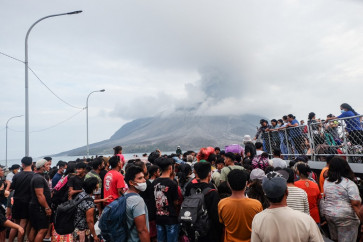Training, partnership help prevent data breaches
Indonesia remains the most prone country to hacks and viruses in Southeast Asia, raising the urgency for awareness toward protecting the data of both businesses and consumers
Change Size

I
ndonesia remains the most prone country to hacks and viruses in Southeast Asia, raising the urgency for awareness toward protecting the data of both businesses and consumers.
Microsoft Indonesia’s national technology officer, Tony Seno Hartono, said that in raising awareness of digital risks and security for consumer and business protection, tech companies could help by partnering with educational institutions to plant ideas.
The company has innovation centers running in five major Indonesian universities.
“Many small and medium enterprises [SMEs] that have worked with Microsoft are gradually showing more interest in fortifying their digital infrastructure, even though the traction is not as much as we had hoped,” Tony said.
Indonesia has a 50 percent infection rate to malware, the highest in the region, with cybersecurity breaches causing losses of up to Rp 33.29 billion, according to Microsoft data.
Digital experts have been encouraging businesses and public services to adopt a culture of vigilance and protection when it comes to managing data centers, as more businesses and government institutions go digital.
By ramping up efforts in digital security, sensitive data will not be breached easily by hackers nor be prone to mismanagement.
“We cannot just rely on the authorities to handle cybercrimes. The response would be too slow. Everyone, from the boss to employees, even customers, has a role in keeping data safe,” said Indonesia Cyber Security Forum (ICSF) cofounder and chairman Ardi Sutedja.
“There must be education on this matter, within schools and companies,” he added.
He also pointed out that not one internet provider in the country has complied with the 27018 International Code of Practice, which dictates protection of personal data.
The industry said to be the most vulnerable to attacks, and thereby the most attractive to breach, was the banking industry. Ardi said the banking industry was 70 percent more targeted than any other sector by hackers, due to the value of financial information.
One way to adopt to evolving technology awareness is to try and utilize the most advanced methods possible to guard data, such as through the use of cloud computing, he said.
“Cloud computing is simpler because it puts application, platform and infrastructure into one system. It runs basically on its own and is more low-cost and easier to manage when disasters occur. Despite this, is Indonesia’s digital infrastructure and ecosystem ready for evolution? That’s also a crucial point,” the Telecommunications and Information Society (MASTEL) board of trustees member added.
In sectors such as e-commerce, which is booming in Indonesia, the use of cloud computing in data centers can be vital to efficiency and could also lead to the development of e-commerce platforms.
E-commerce platforms, Ardi said, must invest more time and funds to build up their digital databases. Those who are enabling e-payment options are also encouraged to use cloud computing to make security more efficient.
According to the Microsoft Security Intelligence report, released earlier this month, Indonesia, along with Pakistan, the Palestinian territories, Bangladesh and Nepal, attract the highest rates of attempted malware attacks.
Countries that attracted the fewest include Japan, Finland, Norway and Sweden, Microsoft said in a new study, based on sensors in systems running Microsoft anti-malware software.
“We look at north of 10 million attacks on identities every day,” Microsoft manager Alex Weinert said as quoted by Reuters. The attacks, however, do not always succeed.
About half of all attacks originate in Asia and one-fifth in Latin America.
Millions occur each year when the attacker has valid credentials, Microsoft said, meaning the attacker knows a user’s login and password. A technology known as machine learning can often detect those attacks by looking for data points such as whether the location of the user is familiar.
----------------
To receive comprehensive and earlier access to The Jakarta Post print edition, please subscribe to our epaper through iOS' iTunes, Android's Google Play, Blackberry World or Microsoft's Windows Store. Subscription includes free daily editions of The Nation, The Star Malaysia, the Philippine Daily Inquirer and Asia News.
For print subscription, please contact our call center at (+6221) 5360014 or subscription@thejakartapost.com









